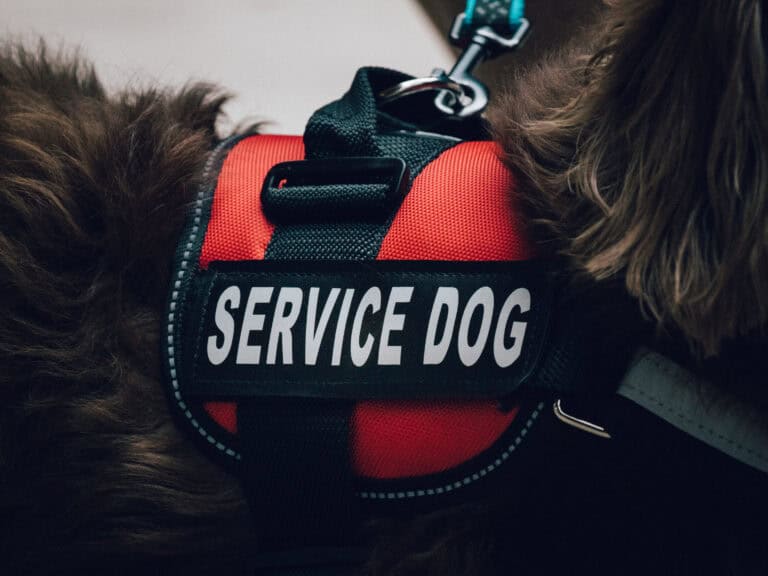At this time of year, many Christmas lists often have a new puppy as one of the top gifts. As such, many families find themselves purchasing a puppy around this time because of that. There is an old adage that “a puppy is not just for Christmas” – and there’s a lot of truth in that statement. When you buy a puppy, you are choosing to invest your time and money towards it for the entirety of its life. You will have the responsibility of raising this puppy through adolescence and into adulthood and making sacrifices for your puppy. If you’re currently in your mid-twenties, you may be almost forty years old before it is time to say goodbye to your companion.
Essentially, what we’re saying is that choosing a puppy is a major long term commitment, and it isn’t a commitment you should enter into lightly. By purchasing a puppy, you are becoming responsible for a life – the life of that dog. It is up to you to care for it and make decisions that are in the best interest of the puppy for the rest of its life. Unfortunately, many families do not realize the scale of their commitment, or even if a dog would be a suitable addition to their lives.
There are many factors that you should consider and research before buying a puppy. Millions of dogs enter animal shelters every year often because of a lack of preparation and planning for this commitment. If you’re thinking about adding a puppy to your family, please read through this article to learn what we believe are the most important things when considering purchasing a pup.
We are always happy to answer any questions from prospective dog owners – reach out to us at dogtraining@blackhillsk9.com for more information. We also maintain resources in our in-house library for you to view while you are at our facility.
Why this breed?
This is the most critical piece of puppy selection. Our second section in this article, “what is the purpose” of your puppy is closely linked to this. You must do your research. Every breed of dog has common characteristics that can be used to categorize them.
Within the breed itself there are nuances that make up varying levels of those characteristics. One common example is the Labrador Retriever. On one side of the spectrum you can have a very docile dog that makes a wonderful family pet and just wants to lay on the couch to receive pets all day. Conversely, you could have a Lab that comes from strong hunting lines whose daily energy cannot be matched and never is able to sit still. This dog can cause all kinds of problems around the house if the expectation is that of a couch potato family pet. So when we say do your research, look at what the dog’s genetics as an overall breed is designed to tell that dog to do. Be aware of what that will mean for you if you choose a puppy of that breed and what to look out for. In that vein, if you have had a dog previously of the same breed, your new puppy may or may not act like your last dog. It is unlikely that you will have a new puppy that came from the exact same parents as your last one and therefore it will not possess the same genetic make up. So don’t go into it expecting the new puppy to be your old dog. It is a completely new genetic makeup and that means you are starting over.
The common characteristics you can look at to categorize breeds are exercise level, grooming, training, and sociability. These will help you look at main factors that when generalized give you an understanding of some of the fundamentals about that breed of dog. Any one category may make or break your decision about a certain breed or all of them combined may give you a well rounded reason why that breed is the right choice.
Some examples, breeds like Belgian Malinois and German Shepherds are often used for working K9s in law enforcement, military, and search and rescue because of their drive, physical size and capability. So if you’re looking for that docile family pet to curl up at your feet at the end of a long day at work, breeds like Malinois and Shepherds who need a lot more exercise and mental stimulation would not be the best breed to select. If you buy a herding breed that is genetically bred to push around and bite at cattle or livestock but you have lots of small children in the house, you may want to consider that the absence of livestock may transfer to them not being very social and nipping at your small children in the house. Again, not an ideal breed for the situation. Choosing the right breed for your situation requires research, time and thought about what may be the best option.
What is the purpose?
As we mentioned, closely linked to the breed of puppy you are looking for, you need to consider what the purpose of this dog will be. In other words – what do you want out of this puppy? It may seem an unusual question, but it is vitally important. Once we define the dog’s purpose, we can begin to analyze other factors in making this decision and selecting a puppy.
Typically, most families want a pet dog who is relatively docile, friendly and relaxed, with a calm temperament, who is easily trainable and will cause them little anxiety or stress along the way. They also want the dog to behave well around members of their own household and any guests who decide to visit. Pet dog owners also usually like to be able to take their dogs out for leisurely walks in public, without fear of the dog becoming problematic around other dogs or people.
Sounds simple enough, doesn’t it? However, what pet dog owners want and what pet dog owners get can often be two completely different things. This can be due to a number of factors. Sometimes it can be misconceptions, misunderstandings, or just lack of knowledge on the owner’s part (“we got a German Shepherd and keep her in his crate all day while we’re at work, and she’s always totally crazy when we return home!” or “my Greyhound is always chasing after rabbits and doesn’t listen to me when I call him back!”). Other times, families can prepare every last detail, but the dog’s behavior may have genetic predispositions that are harder to manage as we mentioned above. This doesn’t mean that people aren’t often well-intentioned when they buy a puppy; what it does mean, though, is that owners should do their due diligence to try and put the odds in their favor, ensuring that the likelihood of the puppy meeting their needs is increased. Also, training and socialization is critical and a good deal of work will be put into this after your prior preparation to set you both up for success.
One way to help in the process when working to pick out your puppy is to physically go through puppy selection and testing. If you have a purpose in mind, such as a family pet, and there is a litter of puppies to choose from, you can go and work with them and observe them. With the idea that this will be a family pet, it may not be the best idea to pick the most energetic and rambunctious one out of the litter.
However, some prospective puppy owners do want a dog with those characteristics. Instead, they may intend to compete with their dog in a dog sport like agility or dock diving, or they may be a working dog handler looking for a puppy who can be trained in skills like narcotics detection or search and rescue. With this in mind, they may actually want a dog with a strong work ethic who will continue to work to solve complex problems – a docile dog would likely not have the necessary drive to succeed. They will be searching for those certain traits in puppy selection.

What personal factors matter?
There are many personal factors to consider before purchasing your new pup. We will present you with a few of those considerations but this list is not all inclusive as we cannot cover everyone’s situation.
Family/home circumstances are one of the most critical life factors to look at. Every family is different, and only you can evaluate if a dog will be a good fit for your family.
- Do you live with any people who may be vulnerable if a larger dog bumps into them (such as young children, or elderly/frail parents)? Are you looking to start a family in the future and what will the dynamic be with a newborn and your dog around?
- Who will be primarily responsible for looking after the dog? Are other family members confident around dogs? Have they had any negative experiences with dogs?
- What will the daily and weekly schedule look like for your family and the dog? Do you have a lot of outside commitments that challenge your ability to care for the dog? Do you travel a lot or plan to take long trips that require someone to care for the dog in your absence?
- How much space do you have at home – both inside and outside? Do you live in a small apartment or condominium? Do you have sufficient access to an area to exercise your dog? Do you plan to move in the near future?
Remember, a puppy is a commitment for 10-15 years, on average. Try to futureproof your plans as much as possible. Your 16-year-old may be happy to take the dog on long walks right now, but what about in a few years’ time when they leave for college? Looking at as many “what ifs” prior to purchasing your puppy will mean that you are ready to address changes to your situation with your puppy and be flexible. Again, there are many other factors to consider for your specific family.
Another consideration is the time of year that you are looking at buying your puppy. Now, this factor also depends on the climate of your current home location. Sweltering temperatures in the height of summer in Texas will make it difficult to get your puppy out for vital socialization activities; at the other end of the scale, impassable snow might make it hard to do the same thing in some states.
Where possible, try to plan for the addition of your puppy for a time of year when you will be able to do those fundamental activities that will help to shape behavior for the rest of its life. If you can wait a few months until the weather is more favorable, you – and your puppy – will likely be thankful in the long run.
What are the projected associated costs?
A large consideration when looking at buying a puppy is cost. I am not just talking about how much you are willing to spend on the puppy to purchase it. I am talking about the financial responsibility you will have over the lifespan of the dog. This requires you to take a look at your current and projected financial situation to make a determination if you can feasibly support all of the associated costs surrounding the purchase of a puppy for the next 10-15 years.
Inevitably one of the first costs to come to mind and certainly one of the largest will be to the veterinarian. There are lots of numbers out there about how much a dog will cost you for their life span. Looking at the averages a good planning factor is roughly $15,000.00. Again, take into account the things you have researched previous to this step in the process, especially when looking at future veterinarian bills.
- Look at the breed again. Is this a small, medium, or large dog and what will that in turn mean for all of the financials?
- Is the breed genetically predisposed to have health issues that tend to cost more?
- Are you willing to pay for additional medical costs in the case of an emergency or chronic conditions such as additional medications or surgeries/specialist care? How much could those cost in your area?
- Are you able to pay for a specific diet of food?
The second largest financial consideration with a puppy is the training cost. Whether you are an avid dog training hobbyist or you have no experience, you should always plan for your dog to be trained at one point or another. Not accounting for such an expense and using money as an excuse for an ill mannered dog is not doing what is in the best interest of the dog. There are a lot of factors to look at with training.
- What is the average cost of dog training in the area you are currently in?
- What is the level of expected training you want for your puppy?
- Are you looking for any specialized training?
- How much time are you going to spend initially training your dog?
- What are you willing to spend for maintenance training of your dog and how often?
- What if your dog develops an issue later in life after its initial training and needs behavior modification training? What is the cost of that training?
Lastly, there are a lot of additional costs to consider when looking at purchasing a puppy. Some of these can be tied into previous considerations.
- Is the purpose of your dog for a particular job or sport and what does the equipment cost? How much will it cost you in travel expenses?
- Do you need to alter things about your home in order to accommodate the dog?
- Do you have a vehicle (that is large enough) to transport the dog?
- What size crate will you need for your dog? How much do crates cost that are suitable for travel in vehicles or airplanes?
- What are you expecting to feed your dog and how much does that cost? How often will you need to purchase dog food?
- What types of leashes, collars, equipment, accessories, and toys might you spend money on?
All of these costs can add up to a significant number overall. That is why it is important to really look at your current and projected financial situation keeping in mind the best interest of the puppy you are potentially buying.
Where to get your puppy
If you have gone through the previous considerations and you get to this point, our recommendation is to find a reputable breeder to work with in the final steps of buying your puppy. Sometimes that is easier said than done. Finding a breeder can be difficult because of the explosion of the breeding industry and the ease of using the internet. There are lots of ways to determine that who you are working with has the best interest of the puppy in mind. We would be happy to discuss navigating that process and working with your breeder. In any case, we have found the most success in this for our clients.
With the abundance of dogs in shelters, it can be tempting to think about heading down to your local animal shelter to pick out your pup. Again, though, there are questions to consider. There also can be a lot of “unknowns.” What is the history of the dog? Where did they live before they arrived at the shelter? Do they have any behavioral concerns? Failing to ask these questions is often the reason that a dog may end up back in a shelter environment. However, learning how you may need to accommodate a dog with a less-than-stellar upbringing or behavioral/health issues can help you decide if the pup can be integrated into your family. Applying this information to all of the previous considerations again and looking at the specifics may help you decide if this is the route you want to go. It is hard to ignore the hardship stories and the reality of shelters for dogs, however, that does not mean you should take on a responsibility that you cannot adequately account for. As mentioned multiple times over, keeping the best interest of the dog in mind with every consideration will help you determine if this is a decision you should make and it should not be done in haste.
Regardless, we feel it is necessary to point out that all of this is your choice. We have found that while people are well intentioned, gifting a dog to someone usually ends in a bad outcome. If you have not had them intimately involved in the process and bring them a dog, it may not end well for the dog or the person or both. Furthermore, if you do receive a dog as a gift and do not think it is a good fit or you are not ready and willing to take on that responsibility, then you owe it to the dog to be realistic and not accept the gift.
What to do if you need help choosing a puppy
There are so many variables when it comes to choosing a puppy. The “cute factor” is real and it is very hard to resist when face to face with a puppy. However, you have to be able to remove emotion from the situation to consider all things involved in buying a puppy. That is what it means to have the best interest of the dog in mind. At Black Hills K9, we understand that this is a crucial decision that will have an outsized impact on the lives of you and your family for years to come. If you have questions about bringing a puppy into your life, please reach out to us at dogtraining@blackhillsk9.com. We will be happy to guide you through the decision-making process to help you obtain a dog that will integrate peacefully and harmoniously into your life.




